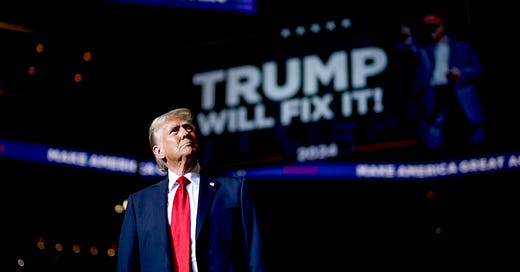Donald Trump Is Neither Tyrant Nor Messiah
Trump is capable of both good and bad. His loudest supporters and most charged opponents are incapable of seeing that.
Look, we need to have a grown-up conversation about Donald Trump's second presidency. Not the Twitter X.com hysteria where every policy decision gets treated like either the dawn of fascism or the Second Coming. Not the cable news shouting matches where nuance goes to die. A real conversation about what's actually happening in this administration.
And, for God’s sake, no more of this.
Here's what I see after five months: Trump is capable of doing both good things and bad things. A revolutionary concept, I know, but apparently we've lost the ability to hold two thoughts in our heads at the same time.
Either you worship every move he makes, or you think democracy died on January 20th. Both positions are exhausting and, frankly, unhelpful for actually governing this country.
The Good: Border Security That Actually Works
Let's start with what Trump is getting right. The border numbers don't lie, and they're stunning. U.S. Customs and Border Protection recorded just 8,347 apprehensions in February 2025, which is a 94% decrease from February 2024's 140,641 encounters. In March, Border Patrol apprehended just 7,181 illegal aliens crossing the southwest border, representing a 95% decrease from the same period last year.
When people stop coming illegally in the first place, you've solved the problem at its source. The American people voted for this in November, and Trump delivered what he promised.
The "Trump effect" is real. Daily southwest border apprehensions have fallen to around 230 per day, a 95% drop from the previous administration's average of 5,100 per day.
That's not luck. That's policy working.
The Good: Supporting Israel Against Iran
Trump's approach to the Israel-Iran conflict has been exactly what American foreign policy should look like: principled but restrained. He's supporting Israel while privately urging moderation, including reportedly rejecting an Israeli plan to assassinate Iran's Supreme Leader. That's leadership, not weakness.
Iran seeks nuclear weapons to threaten both Israel and the United States. Trump has worked to maintain nuclear talks with Iran while making clear that military options remain on the table. This isn't appeasement, it's "peace through strength" done right.
The Good: Rolling Back Regulatory Red Tape
The deregulation push is working. Trump's administration has saved Americans over $180 billion by halting proposed Biden-era regulations, averaging $2,100 per family of four. The 10-to-1 elimination rule, requiring agencies to eliminate ten existing regulations for every new one, is exactly the kind of structural reform we need.
When EPA Administrator Lee Zeldin announced "the most consequential day of deregulation in American history," rolling back trillions in regulatory costs, that wasn't destroying the environment. That was removing barriers to economic growth while maintaining essential protections.
The Concerning: Procedural Shortcuts That Set Dangerous Precedents
But here's where Trump's approach becomes problematic, and it has nothing to do with the policies themselves. It's about how he's implementing them.
The Supreme Court has been remarkably consistent in its message to Trump: you have broad executive powers, but you must follow proper procedures. Chief Justice John Roberts and the conservative majority have repeatedly granted Trump most of what he wants while emphasizing the need for constitutional compliance.
The problem isn't that Trump is exercising presidential authority — it's that he's cutting procedural corners to do it faster. Multiple federal judges have ruled against Trump's actions on procedural grounds, only to see the Supreme Court allow the policies to continue on technical grounds while avoiding the constitutional merits.
This matters because precedent cuts both ways. If Trump can bypass normal procedures to implement policies conservatives like, the next Democratic president will use those same precedents to implement policies conservatives hate.
The expansion of presidential power is a zero-sum game. What Trump gains today, his opponents can use tomorrow.
The Concerning: Broad Tariffs That Hurt Americans
Trump's targeted tariffs on China make strategic sense. China is an adversary that steals intellectual property and threatens our national security. But imposing broad tariffs across every nation, including allies, doesn't serve American interests, it just makes everything more expensive.
The numbers are stark: current tariffs are costing American households an average of $1,200 annually, with some estimates reaching $4,400 per household in 2025. A federal court blocked most of Trump's universal tariffs, finding the president overstepped his authority.
This isn't about what's "fair" to America. Fairness is a luxury we can't afford. It's about what strategically benefits us. Tariffs on adversaries? Absolutely. Tariffs on allies who buy our agricultural products and provide critical supply chain components? That's just shooting ourselves in the foot.
The Real Problem: Too Many Voices, Not Enough Unity
The deeper issue with Trump's presidency isn't ideological, but rather operational. Trump thrives on competing voices and internal drama, but at some point, you need unity and cohesion to govern effectively.
Look at the contrast between Secretary of State Marco Rubio's measured diplomatic approach and some of the more chaotic elements of the administration. When Treasury Secretary Scott Bessent had to clean up the tariff mess after markets panicked, that showed the value of having serious people in serious positions.
Frankly, if Rubio and Bessent were the primary voices leading this administration's policy implementation, I think we'd see a lot smoother and more effective governance. Both understand that diplomacy and economic policy require precision, not just bold declarations.
Beyond the Cult of Personality
The biggest problem in our political discourse isn't Trump. It's the cult of personality that's grown up around him, and equally, the reflexive opposition that treats every Trump policy as automatically wrong.
People who are chronically online have lost the ability to evaluate individual policies on their merits. Either Trump is a genius playing 4D chess, or he's a fascist destroying democracy. Neither framework helps us actually govern.
Trump's approval ratings tell the story. He's underwater in most polls, with approval ranging from 39% to 47% depending on the survey. Americans can see both the successes and the problems. They want the border secured, but they're worried about tariff-induced inflation. They support strong leadership, but they don't want constitutional shortcuts.
The Supreme Court is trying to thread this needle, allowing Trump substantial executive power while insisting on proper procedures. Congress needs to do the same thing. Support good policies while insisting on constitutional compliance.
The Path Forward
Here's what responsible governance looks like: Continue the policies that are working, fix the ones that aren't, and always follow proper procedures.
Keep the border security measures that have reduced illegal crossings by 95%. Maintain support for Israel while working diplomatically to prevent regional war. Continue the regulatory rollback that's saving families thousands of dollars.
But drop the universal tariffs that are hurting American consumers and allies. Follow Supreme Court guidance on procedural requirements. And for the love of all that's holy, get the competing voices in the administration singing from the same hymnal.
Trump isn't a tyrant, but he's not infallible either. He's a president capable of both good decisions and bad ones. The sooner we stop treating every political figure as either a savior or Satan, the sooner we can actually focus on governing this country effectively.




